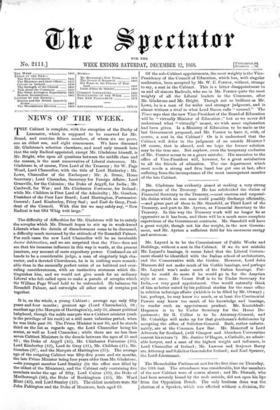Mr. Layard is to be the Commissioner of Public Works
and Buildings, without a seat in the Cabinet. If we do not mistake Mr. Layard's leanings, it seems fated that the Liberal Govern- ment should be identified with the Italian school of architecture, and the Conservative with the Gothic. However, Lord John Manners did not make much of his Gothic leanings, and perhaps Mr. Layard won't make much of his Italian leanings. Per- haps he could do more if he would go in for the Assyrian style at once. Mr. Grant Duff is to be Under Secretary for India,—a very good appointment. One would naturally think of him as better suited by his political studies for the same office in relation to foreign affairs (which is to be filled by Mr. Otway) ; but, perhaps, he may know too much, or at least the Continental Powers may know too much of his knowledge and leanings, to render such an appointment prudent. Mr. Knatchbull- Hugessen is to be Under Secretary for the Home De- partment; Sir R. Collier is to be Attorney-General, and Mr. Coleridge will make up for that gentleman's deficiencies by accepting the office of Solicitor-General. Both, rather unfortu- nately, are at the Common Law Bar. Mr. Moncrieff is Lord Advocate for Scotland, (will Glasgow and Aberdeen Universities contest his return ?) Mr. Justice O'Hagan, a Catholic, an admir- able lawyer, and a man of the highest weight and influence, is Lord Chancellor of Ireland ; Mr. Lawson and Serjeant Barry are Attorney and Solicitor Generals for Ireland ; and Earl Spencer, the Lord-Lieutenant.


































